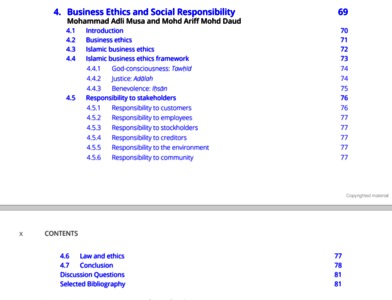Musa, Muhammad Adli and Mohd Daud, Mohd Ariff
(2020)
Business Ethics and Social Responsibility.
In:
Islamic Business Administration: Concepts and Strategies.
Macmillan Education Ltd, London, UK, pp. 69-81.
(Unpublished)
Abstract
There appears to be not much difference between mainstream and Islamic business ethics. Both are aimed at providing guidelines for ethical business practices, though the ways in which they do so might differ. Mainstream business ethics rely on rules determined by legislation, nature-specific guidelines of the business, codes of conduct of individual business organisations, and personal morals of members of the organisation in guiding businesses to make ethical decisions. Islamic business ethics on the other hand is mainly governed by sharīʿah principles that inform individuals and business organisations of their legal and ethical obligations. However, what is legal or permissible need not necessarily be ethical. What distinguishes Islamic business ethics from its mainstream counterpart is the tawḥidīc paradigm. Accountability to God, revelation as a source of ethical guidance and reference to life in the Hereafter demarcate Islamic ethics in general from ethical theories and philosophical analysis underlying mainstream business ethics. Islamic business ethics has not undergone the developmental stages of mainstream business ethics and thus has yet to emerge as a distinctive academic field; it is part of the larger framework of Islamic ethics, economics and finance altogether. This is understandable as Muslims claim that ethical values are expected to permeate all aspects of life.
This chapter explore the concept of Islamic business ethics. It presented the differences and similarities with the business ethics in general. In particular, Islamic business ethics lays open a framework of three core principles: god consciousness (tawhid), justice (adalah) and benevolence (ihsan). Adherence to the Islamic business ethics principles could potentially offer a new paradigm in doing businesses, that are more just and with better consideration towards others
Actions (login required)
 |
View Item |
![[img]](http://irep.iium.edu.my/85437/1.hassmallThumbnailVersion/table%20contents.png)
![[img]](http://irep.iium.edu.my/85437/2.hassmallThumbnailVersion/islamic%20business%20admin.jpg)




 Download Statistics
Download Statistics Download Statistics
Download Statistics